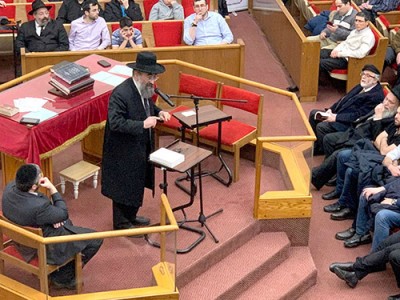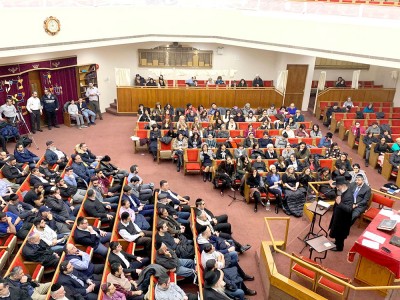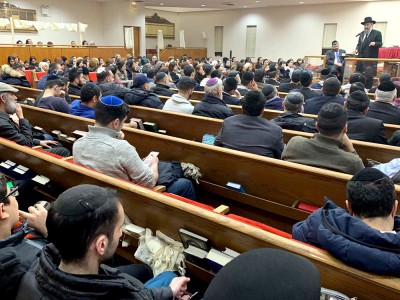


On Wednesday March 13th, Congregation Ner Mordechai (formerly Shaarei Tova), in partnership with the CHAZAQ Organization and EMET Outreach, hosted a large crowd of guests from Jewish communities around NYC for a night of unity in Torah learning. The night began with a full hot-buffet dinner, sponsored anonymously. The guests then filled into the main shul, immediately packing its many seats.
The MC of the event was Yaniv Meirov of Chazaq. He thanked everyone for joining together and updated the audience on various projects taking place throughout the community.
Then introductory words were given by Rabbi Nerya Aminov of Congregation Ner Mordechai. He spoke about the importance of working together for the future of the Jewish communities in NYC. He also stressed the power of Torah learning, and the message of the holiday of Purim. The Rav then introduced Guest Speaker and renowned lecturer Rabbi Eli Mansour.
Rabbi Mansour spoke at length about the interpersonal relationships upon which Judaism survives. He highlighted the connection between teacher and student, along with father and son. We are a people of transmission, who receive the Mesorah (tradition) and give it over with love and respect. This is what the cursed nation of Amalek tries to interrupt, from generation to generation. He sows discord between teachers and their students, fathers and their children. But the Torah teaches us to combat his influence with the golden example of Moshe Rabenu, who equated his disciple Yehoshua with himself.
As taught in Pirkei Avot, a teacher must respect his student, even as he receives respect. This ability to love and respect each other, especially during the crucial moments in which we transmit our nation’s DNA to the next generation, is what gave Queen Esther and Mordechai HaTzadik the impetus to hint an unfinished war within the text of the Megilah. With Divine Inspiration and clear for everyone to see, the Megilah records the hanging of Haman’s ten sons. With three letters, all smaller than their peers, we decode a numerical value identical with the year of the Nuremberg Trials. It was in that year when, in a most unusual choice for a modern military court, ten ideological sons of Hitler Y”S were hung by their necks.
The next speaker was Harav Yitzchak Yisraeli, the Chief Rabbi for the Bukharian communities of America and Canada. He spoke about the central role Torah Learning has in the life of our nation and revealed the depth to which it shields us from our enemies. If the above portion discussed the direction of Amalek’s attack, the present discussion covered the way in which we become vulnerable to his onslaught. It’s all about the Torah Learning. The Medrash tells us that our shelter from danger is the words of Torah we struggle to understand and the sweat we shed absorbing its message. Hashem forms a spiritual roof over our heads with this power; if we Chas Ve’Shalom become lazy, we become vulnerable to the dangerous elements.
It is the same power, the same energy that flowed through the veins of a valiant and victorious King David and his warriors because of the men which learned Torah in Yeshivot of Yerushalayim. As the Talmud (Makot 10) tells us, David cried “I pursued my enemies and overtook them; I did not turn back till I destroyed them (Psalms 18:38),” only because of the Torah scholars who’s … feet stood inside your gates, O Jerusalem [and studied the Torah] (Psalms 122:2)”. The same Torah protects a person even when his body is used and buried. The Torah stands up for the soul that labored in it, and guides it to its place in Gan Eden. Our Rabbanim tell us that on Purim, the Jews accepted the Torah again with love. It is this which allows us to defeat our enemies whenever and wherever they rise up.
The final speaker of the night was Rabbi Y.Y. Jacobson. He focused on a third element of our resilience in the face of our enemies, the ability to empathize. Our first national leader was Moshe Rabenu. Our Sages tell us that Moshe actually had ten names! The name we call him is actually a name that his Egyptian ‘mother’ named him. Why does the Torah use that name, rather than the name his actual mother gave him (Tuvia)? The Torah uses the Egyptian name because it wants us to draw a parallel. It is the same reason that the Megilat Esther records how Mordechai HaTzadik’s persistent visitations to the courtyard of the king’s harem.
Moshe was raised Egyptian. He understood its upper-class culture. He lived in the heart of the aristocracy and experienced all of the sophistication which comes with royalty. Yet the Torah introduces us to him at the time when he went out to see the slaves of the king. He saw an Egyptian taskmaster mercilessly beat a Jew and understood that death was forthcoming. He killed the taskmaster and risked everything. Was that logical? What would he achieve for the Jewish nation by saving a single Jew for a one day or two? He was smart; didn’t he see the big picture? Hashem put him on the path to the throne! If he played his cards right, he could be Pharaoh himself and free the entire nation! But Moshe understood stood at the nexus of his Egyptian life and Jewish identity, and he chose empathy and compassion. No Jew is fodder for the political wheel-of-fate. It was this same character which caused him to chase a wandering sheep; he understood that it was merely thirsty.
Mordechai was the same. The Sfas Emes says that the reason Mordechai visited the kings Harem was to catch a glimpse of Esther as often as he could find one. He was concerned for her spiritual, emotional and physical well-being. Did she need advice, did she need encouragement? It was through this empathy that Hashem set the stage for the Jewish people’s redemption. By standing at the gate, Mordechai heard the nefarious plans of two disgruntled ministers who conspired to poison the king. When the king later questioned the loyalty of his closest minister Haman, it was this event which enlightened him to Mordechai’s true loyalty and character.
By the end of the unity event, it was clear to all who attended that the story of Purim and our salvation in each generation is dependent on our relationship with Hashem through his Torah, and our relationship with each other. Thank you EMET Outreach, the CHAZAQ Organization, and Congregation Ner Mordechai for putting this beautiful event together.
Unity Event With CHAZAQ, EMET & Cong. Ner Mordechai Features R’ Mansour, R’ Jacobson & Chief Bukharian Rabbi Harav Yitzchak Yisraeli
Typography
- Smaller Small Medium Big Bigger
- Default Helvetica Segoe Georgia Times
- Reading Mode


